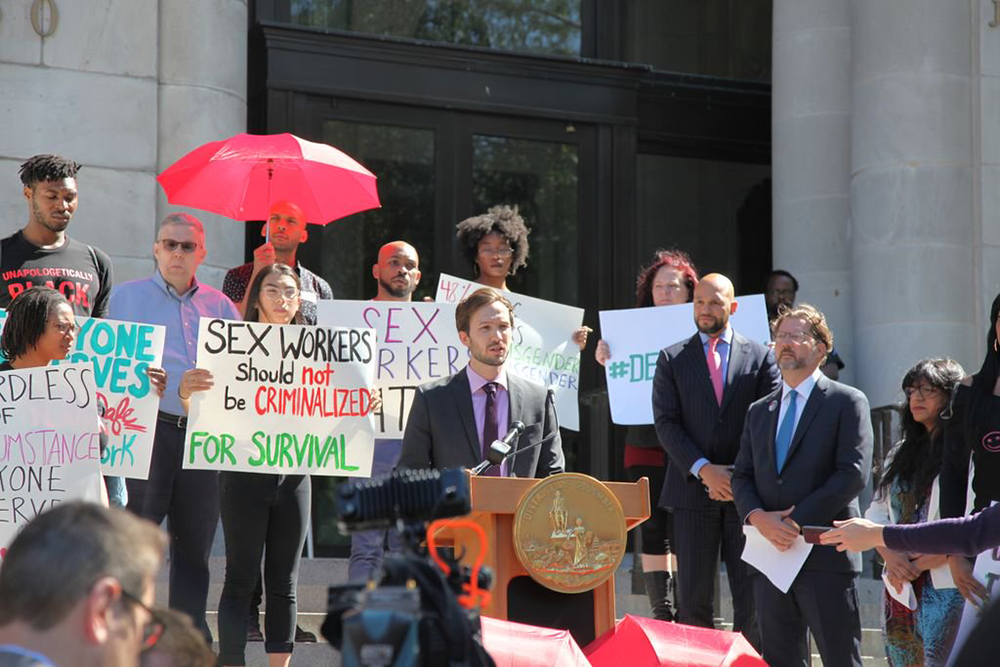After a more than 14-hour Washington, D.C. Council hearing on a bill that would take steps to decriminalize some sex work in D.C., the Georgetown University Student Association Senate voted in favor of a resolution supporting the bill at their meeting Sunday.
The GUSA resolution endorsed the D.C. Council Community Safety and Health Amendment Act of 2019, a bill that would decriminalize prostitution for individuals over 18 years old and create a working group that would examine how to decriminalize other types of sex work.
The bill is awaiting a vote in the Council’s Committee on the Judiciary and Public Safety, but the Council’s chair, Councilmember Charles Allen (D-Ward 6), indicated he does not plan to bring the measure to a full committee vote in the near future, according to DCist.

The GUSA resolution supporting the D.C. Council bill passed in a 20-6 vote. During a debate period about the resolution, many senators who supported the bill highlighted higher participation rates by the LGBTQ community in the sex work industry. The 2015 U.S. Transgender Survey found that 19% of all transgender people have participated in sex work.
The GUSA-sponsored D.C. Council bill would support current and future members of the Georgetown LGBTQ community as well as students currently working as sex workers, according to freshman senator Eric Lipka (COL ’23), who introduced the GUSA resolution.
“With the resolution, I hope that it also sends this message to the queer community on campus: We see you. We stand with you. We support you. You are valid, and your interests are our interests, and we will continue to fight for you and your rights on campus,” Lipka said in an interview with The Hoya. “I feel that it is my duty to let them know that they belong here and should not be criminalized and dehumanized for their work.”
Opponents of the GUSA resolution cited personal beliefs and a lack of research on the number of students involved in the sex work industry as their concerns. Sam Dubke (SFS ’21) voted against the resolution over the potential implications of supporting the bill, which he argued during the debate period.
“I think decriminalization is a conversation that we can positively have, but as this piece of legislation stands, I think it is too urging of the act itself,” Dubke said during the period of debate on the GUSA resolution. “I also have personal morality; I think that I can’t vote on something that encourages this kind of work.”
The D.C. Council bill met similar opposition to the GUSA resolution after a committee hearing on the topic Oct. 17. After originally introducing the bill to the Council in 2017, Councilmember David Grosso (I-At-Large) reintroduced the measure on June 4. After hearing the testimonies of sex workers, which included D.C. college students, Grosso concluded that sex work should be decriminalized and drafted the bill, he wrote in an email to The Hoya.
“It is overdue for D.C. to change how we address commercial sex in our city,” Grosso wrote. “By decriminalizing sex work between consenting adults and retaining prohibitions against force, coercion, and human trafficking, we can take sex work out of the shadows, reduce violence, and improve the provision of health and other services to sex workers.”
Tamika Spellman, who serves as a policy and advocacy associate with HIPS, a non-profit that provides medical services, education, and support to drug users and those in the sex industry, testified before the D.C. Council in support of the bill.
Spellman has personally faced discrimination by local police as a sex worker in D.C. because of sex work’s illegal status, she said. The D.C. Council bill would be a positive step toward preventing similar experiences for certain sex workers whose work would be decriminalized under the bill in the District in the future, according to Spellman.
“We’re asking for a relaxing of some laws so that people can work more efficiently, work safer and not be pushed around by the police holding the criminality over their heads,” Spellman said in a phone interview with The Hoya. “Sex workers are going to be ultimately safer; we will feel a lot better about reporting crimes that do happen to us.”
Last year, H*yas for Choice, a pro-reproductive rights organization, alongside the Georgetown Black Student Alliance and GU Queer People of Color, co-hosted a conversation with Spellman as a part of their sex work series.
The D.C. Council bill would directly support Georgetown student sex workers, according to HFC leadership.
“H*yas for choice is strongly in support of sex work decriminalization, as we believe everyone should be free to make decisions about their bodily autonomy and that decriminalization makes sex work safer,” the group wrote in a statement to The Hoya. “There are Georgetown students who are sex workers and whose lives would be directly improved by decriminalization.”
Hoya Staff Writer Riley Rogerson contributed to this reporting.





















Jim • Nov 8, 2019 at 3:03 pm
Remind me how this is even remotely related to GUSA’s mandate?
Jack • Nov 9, 2019 at 2:44 pm
Ok boomer